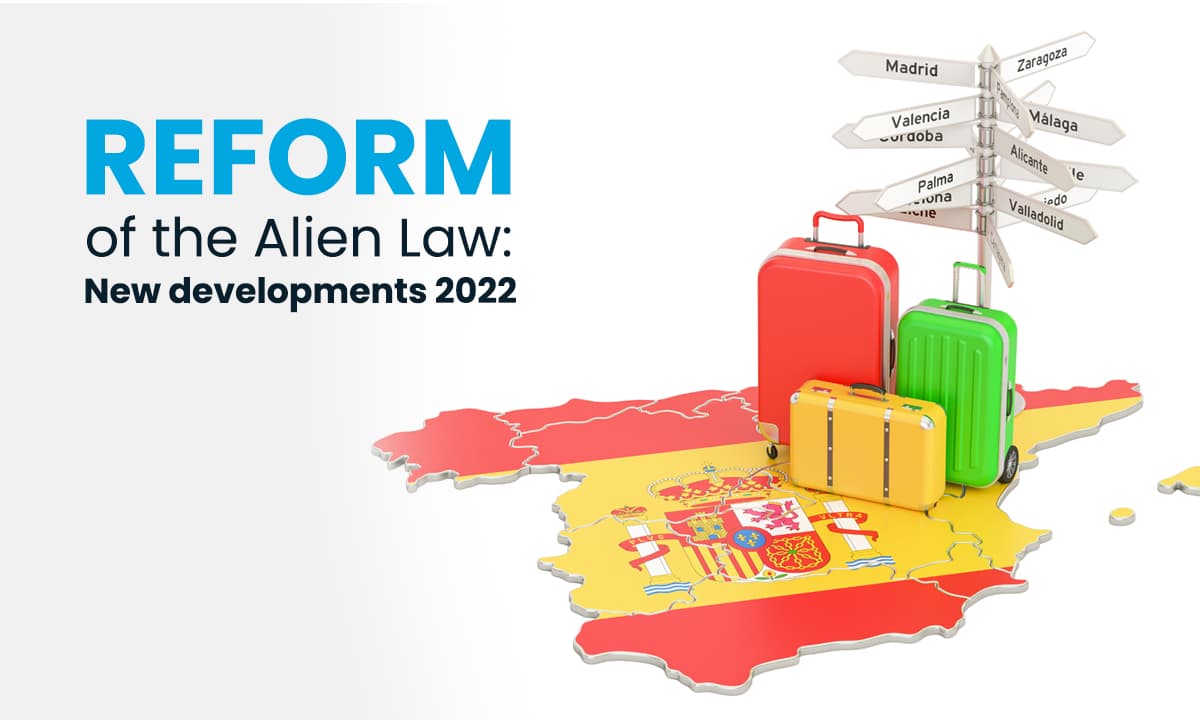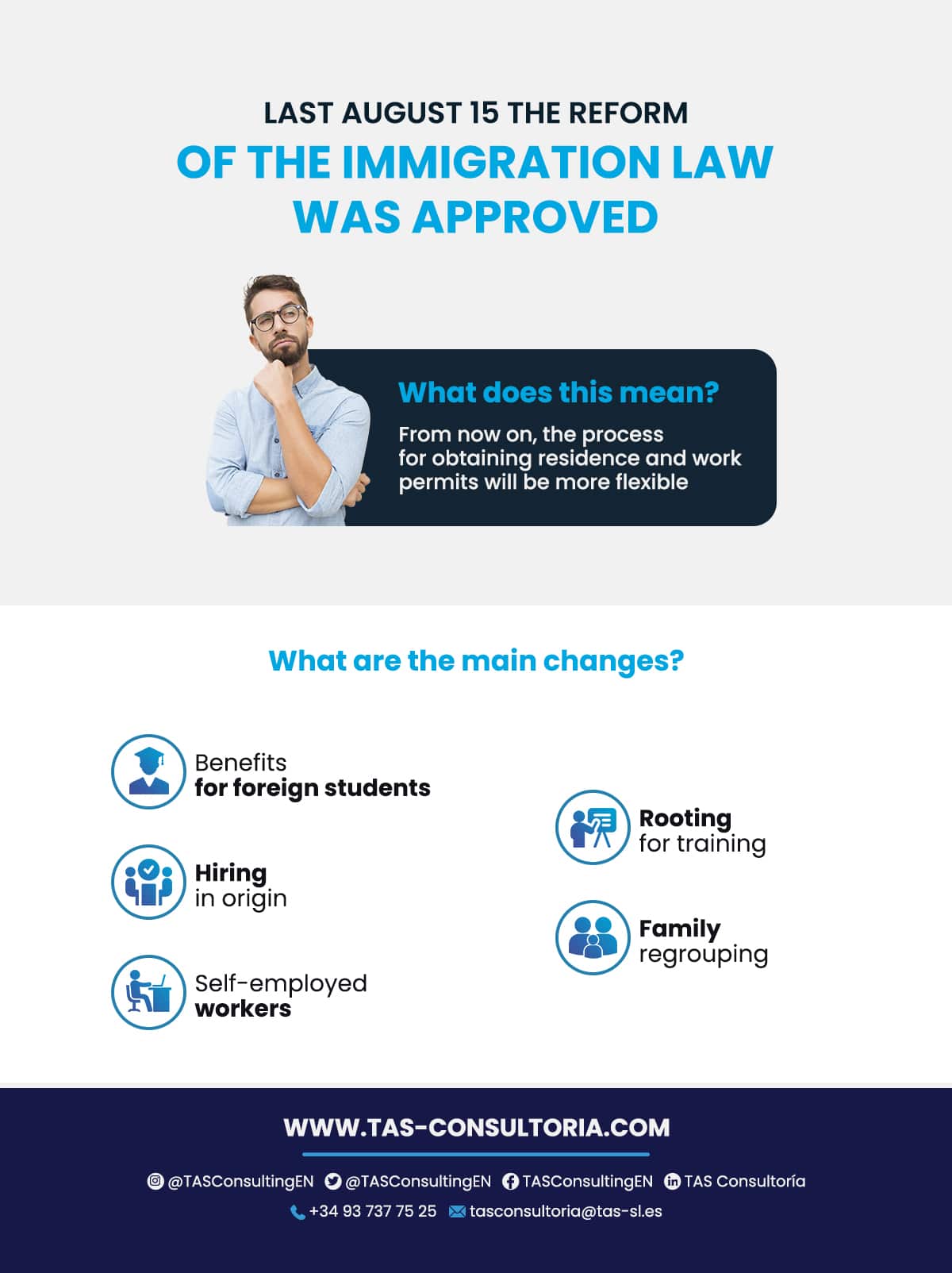On August 15, a new reform of the Foreigners Law came into force in Spain. Have you heard what it consists of? Do you know what the benefits are for immigrants? Stay with us in this article and find out below!
What does the foreigners Law consist of?
Currently, Spain is the sixth country in the European Union with the highest number of irregular immigrants, and in general terms it is estimated that there are around 5.5 million foreigners living in the country.
For this reason, paying attention to the relevant regulations has been a very important starting point for the Government. Thus, an amendment to the immigration regulations was published in the Official State Gazette on July 27 and came into force on August 15.
It should be noted that this initiative was promoted by the Minister of Migration, José Luis Escrivá, with the main objective of making the process to obtain a work authorization more flexible, thus affecting both irregular immigrants who are in Spain, as well as people who can be hired from their country of origin.
In short, the Law on Foreigners will facilitate the possibility of applying for a residence and work permit in Spain, as well as promote self-employment and employment opportunities for students.
What are the main changes?
Taking into account the current situation in the Spanish labor market and the difficulties in obtaining a work permit for foreigners, certain changes were proposed in the reform of the Law on Foreigners that could benefit the economy.
In this regard, the regulation focuses on three key pillars:
Making it easier for non-EU foreigners to obtain a work permit.
Facilitating the obtaining of a work permit compatible with a study permit
Allowing foreigners in an irregular situation to obtain residency permits.
You may also be interested in: EU Stability and Growth Pact
Benefits for foreign students
Previously, foreigners with student visas were not allowed to work in Spain to pay for their studies. However, under the new regulations, the foreign student community is legally allowed to work about 30 hours per week.
Another advantage of the reform is the possibility for students to stay one more year in the country, once they have completed their program of studies, without having to request an extension of stay.
Geographical limitations are suspended, so students are allowed to work anywhere in Spain, as long as it does not interfere with their study plan and the hours stipulated by law.
Finally, the modification of student visa to work permit can be carried out much more quickly, since it will not be necessary to comply with the stipulated waiting period previously stipulated for the procedure, i.e. 3 years.
Rooting by training
At this point, those who have stayed in Spain for a minimum period of 2 years will be allowed to apply for a 12-month residence permit, as long as they commit to comply with a regulated training to a job.
The Spanish authorities see an opportunity in allowing people in an irregular situation to access the labor market by first going through a training process.
Thus, once they have completed their studies, they will be able to opt for a modification to a work permit when they get a job offer that meets, at least, the minimum SMI stipulated in Spain.
You may also be interested in: Spain Entrepreneurial Nation Strategy: what does it consist of?
Hiring at source
With the regulation of foreigners, hiring in the countries of origin themselves becomes more flexible. What does this mean, you ask?
Temporary workers, known as “temporeros”, may have access to a 4-year authorization that allows them to work for up to 9 months, provided they commit to return to their countries after each period of work.
Likewise, by respecting the established rules, these workers will have the possibility to opt for a residence and work permit valid for 2 years, which can be extended.
On the other hand, the Government considers it relevant to improve the Catalog of Difficult-to-Fill Occupations, which means that employers will find it easier to find personnel.
Family reunification
If you are a foreigner, you have probably already heard about family reunification in Spain, a process that allows family members of foreigners residing in the country to obtain legal residency.
In the previous foreigners Law, the procedure for receiving this residence permit did not allow for the immediate obtaining of a work permit, whereas, with the new reform, upon renewal of the family reunification, a work permit will be automatically acquired.
In addition, there is a relaxation of the requirements for family reunification when minors, disabled or vulnerable persons are involved.
Self-employed workers
In addition to the aforementioned benefits for employees, in the case of self-employed workers coming from third countries, certain changes are sought.
In this regard, the requirements to be presented by self-employed workers are also made more flexible, and a Unit for the Processing of foreigners Files is created in order to speed up the process.
In addition, the aim is to reduce the economic means required from self-employed foreigners when demonstrating that they will carry out a project in Spain.
The reality is that the Spanish Government hopes that many migrants can benefit from the measures implemented in the reform of the Immigration Law to boost the labor sector and avoid inconveniences in immigration and residency procedures.
You may also be interested in: Which are the safest autonomous communities in Spain?
If you are interested in emigrating to Spain or you are already in the country and need advice to regularize your situation and carry out your procedures successfully, in TAS Consultancy we will become your trusted partners. Contact us through our website and solve each of your doubts!






Your email address will not be published .
Required fields are marked with *